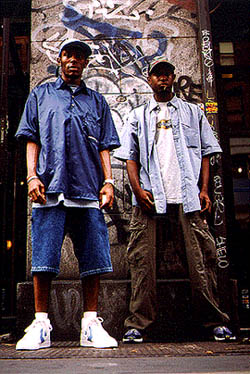Hip-Hop's Radical Roots


Initially, MCs served to comment on the DJ's skills, but the spoken-word vocalists soon developed their artistry from a long tradition of black "dozens" boasting, metaphoric inventiveness, blues singing, and "scat" vocals. A seminal 1982 single features Grandmaster Flash and the Furious Five delivering deft commentary on the psychological impact of their surroundings and the societal mechanisms that gave rise to (and maintain) the urban ghetto. Appropriately, it's entitled "The Message". Hip-hop represented a politically motivated alternative to crime and violence; it was the voice of the voiceless; it was keeping kids on the right path. Amidst the current glut of fiercely individualistic commercial rap, avatars of hip-hop's community emphasis persist. Brooklyn-based Mos Def and Talib Kweli's 1998 Black Star (Rawkus Records) album combines serious hip-hop's radical formal wordplay with consciousness-raising lyrics. It was heralded as one of the best independent releases in 1998, an important alternative to frivolous megastars such as Puff Daddy. The upcoming Isolationist album (Jazz Fudge Records) will pair the afro-futurizm of the Anti-Pop Consortium's MCs with Russian-born DJ Vadim's abstract beats. Their collaboration bespeaks hip-hop's international cohesion and ability to translate across cultures. |

